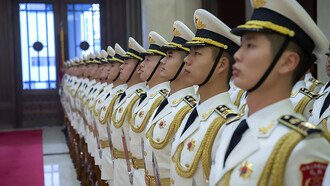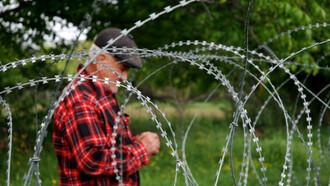Speaking to the American Congress, President Joe Biden warned, "If Putin takes Ukraine, he won’t stop there... Putin will attack a NATO ally, and then “we’ll have something that we don't seek and that we don't have today: American troops fighting Russian troops..."
Biden’s scenario is not implausible, but it is not the most probable. It appears dubious that Russia’s President Putin will be able to “take” all of Ukraine and then purposely attack NATO members, although Moscow has intensified its attacks on Ukraine.
What is much more likely than a direct Russian attack on NATO members is that the “new Crimean war” will first expand to regions outside of NATO’s Article V defensive mandate, even if Moscow itself is not necessarily directly responsible for the widening of all of these conflicts but concurrently seeks to use them for its geopolitical advantage.
The widening of the NATO-Russia war over Ukraine since February 2022 is already taking place, given the outbreak of the war between Israel and Hamas over Gaza since October 2023. These two conflicts have begun to destabilize much of the “wider Middle East”―as the their strategic-economic impact continues to overlap and interlink.
New fronts could accordingly be generated as the global system risks polarizing into two rival alliances. The US and NATO (that includes Turkey) and the EU (that does not include Turkey) have increasingly been linking in military, political and/or economic terms with third states, including the AUKUS alliance of the US, UK, and Australia, plus the Abraham accords of the US, Israel and the UAE, among other states.
These US-led alliance systems are intended to “constrain” the opposing China-Russia Eurasian "axis," which includes the Shanghai Cooperation Organization and the BRICS countries (Brazil, Russia, India, China, and South Africa) that now include Egypt, Saudi Arabia, the United Arab Emirates (UAE), as well as Iran. Not all the BRICS states are in full strategic agreement, so Saudi Arabia, the UAE, Brazil, South Africa, and India, among others, cannot really decide which side they will take... until pressed to do so... Likewise NATO-member Turkey and Indonesia represent pivot states that could shift sides as well.
The Israeli-Hamas war over Gaza has already begun to expand into the West Bank as Israeli colonists seek to force Palestinians out of Palestinian-controlled territories since October 2023. Tensions between Lebanon, Hezb’allah and Israel have continued to mount as Hezb’allah and Israel’s IDF counter-attack each other in northern Israel and southern Lebanon. Israel’s desire to assassinate all Hamas leaders believed to be responsible for the October attacks, as illustrated by the assassination of a Hamas leader in Lebanon, could likewise expand the conflict into new regions. While both sides claim that they do not want to widen the conflict, neither side wants to appear “weak” and be seen as backing down either.
U.S. and Israeli airstrikes against Iranian-backed militias who have attacked US forces in Iraq and Syria raise the prospects of direct conflict with Iran. Concurrently, missile and drone attacks by Houthis in South Yemen (with Iranian backing) threaten to strangle some 12% of the world’s trade, which includes 8 percent of global grain trade, 12 percent of seaborne-traded oil, and 8 percent of the world's liquefied natural gas trade. Repeated Houthi attacks could result in direct US and Allied offensive intervention against Houthi positions in Yemen. Such Allied threats to attack the Houthis would only add to Yemen’s misery as one of the world’s worst humanitarian crises, along with Sudan and now Gaza—if engaged diplomacy cannot resolve the conflict.
Without a diplomatic settlement, the insecurity-security dialectic could soon escalate despite (or because of) the deployment of US aircraft carriers and warships in the Mediterranean and Persian Gulf. The Pentagon has additionally hoped that Operation Prosperity Guardian will engage at least 20 countries in the effort to defend the Red Sea against Houthi attacks. Yet the Operation has not yet gained the support of the major Arab-Persian Gulf countries including Saudi Arabia, Qatar and the UAE, as well as China. This lack of Arab support is in part due to the fact that the Operation Prosperity Guardian is seen as supporting Israel―even if Egypt will suffer the consequences from the reduction of trade through the Suez.
A blockage of the Red Sea route through the Bab El Mandeb chokepoint to the Suez Canal has already raised the global costs of shipping by augmenting the length of travel and costs of insurance. Loss of Egyptian income from the Suez Canal—at the same time that Israel, in a form of hybrid war, has been pressing Cairo to deal with Israel’s displacement of Palestinian refugees from Gaza in a new Nakba—could work to undermine Egyptian President Sisi’s already shaky repressive controls over Egypt with its strong Muslim Brotherhood movement.
On the one hand, Israel’s destruction of Gaza, its indiscriminate killing of civilians, and its brutal acts of collective punishment for the October 7 Hamas attack on Israeli civilians will lead more Palestinian men and women and supporters to join “terrorist” organizations. On the other hand, the brutal collective punishment of Palestinians will provoke an anti-Israeli backlash throughout much of the Arab and Islamic world, forcing leaderships that had started to open relations with Israel, to freeze or abandon ties. Such tensions will concurrently spark a regional arms race that could result in nuclear weapons proliferation—and not Iran alone—as Saudi Arabia and Turkey have both threatened the nuclear option.
In the background of the conflict are Israeli fears of Iran’s development of nuclear weaponry. There is danger that Israeli prime minister, Benjamin Netanyahu, has sought to “eliminate” both Iran and the Iranian-backed “axis of resistance”―particularly if Teheran appears to commit itself to further enriching uranium to the point of developing nuclear weapons and delivery capabilities. To attack Iran directly, Tel Aviv needs US backing. Yet this does not prevent Tel Aviv (and the US) of supporting Kurdish and Baluchi independence movements inside Iran, as accused by Teheran. Ironically, the purported “Islamic State” terrorist attacks on Shi’a Iran appear to be serving US and Israeli efforts to further destabilize the country.
Thus far, Israel has not been unable to draw the US into the fray, although continual Iranian-backed attacks on US forces in the region could do the trick, as could Iranian efforts to counter US forces in the Arab-Persian Gulf through the deployment of anti-ship missiles and mines, plus the probable acquisition of advanced Russian SU-35s fighter jets which could threaten US defense capabilities.
In general, the wars in the Black Sea and Red Sea will significantly augment the general condition of stag-inflation by means of rising transport, food, energy and resources prices, combined with additional taxes, preparations for war, military drafts, and other factors that are directly or indirectly related to the “new Crimean War”. The latter globalizing factors could further augment socio-political tensions that spark civil wars in certain countries that could then lead to new international military interventions—much as has already proved the case for Somalia, Ethiopia, and the other countries near the Horn of Africa.
Interstate conflict, and the rise of piracy and anti-state terrorist groups, such as al-Shabab’, among others, on the Horn of Africa has resulted in a scramble by China, the UAE, Saudi Arabia, Qatar, Turkey, as well as Japan, Russia and India to establish naval bases in Djibouti and/or the region―in addition to the bases of the US, France, the UK, Germany, Italy, Spain already established in Djibouti. In addition to the dangers posed by piracy and anti-state “terrorism,” both India and the US have been concerned with the burgeoning influence of China’s blue water navy in the Bay of Bengal, the Straits of Malacca, as well as the South China and East China seas.
Strong Russian ties to North Korea represent a double gambit. On the one hand, Russian purchase of North Korea’s conventional weaponry has permitted Russia to intensify its missile strikes against Ukraine. On the other hand, by strengthening its ties to North Korea, Moscow is able press China into closer defense ties. This is true given the fact that North Korea’s conventional and nuclear weapons programs threaten both Japan and South Korea and force the latter two US allies to boost their defense capabilities. By the nature of the insecurity-security dialectic, this increase in defense spending, in turn, raises additional tensions with China―and presses Beijing to look back to Moscow for energy and defense supports to defend itself against US alliances.
The US-Japanese-South Korean alliances, coupled with the AUKUS Pact of the US, the UK, and Australia, plus stronger perceived US support for Taiwan independence, all press China into closer defense ties with Moscow. These US-led alliances, seen as “encirclement” by Beijing, raise the question as to whether China and the US can eventually reach a grand compromise—or else explode into a larger regional war—at the same time that the civil war in Myanmar has intensified. At the start of the western 2024 New Year, Chinese president, Xi Jinping, whose totalitarian executive powers have been admired by former President Donald Trump, once again proclaimed that China’s unification is inevitable—in his (failed) effort to scare the Taiwanese population just before Taiwan’s presidential and parliamentary elections held on January 13, 2024.
The refugee, drug, and weapons crisis along the U.S.-Mexican border has been leading Trumpists in the US to advocate military intervention with drones and special forces in Mexico against drug cartels—with or without the permission of Mexican authorities. Here, Washington has not been able to crack down on conventional arms sold to Mexican drug cartels that are being used against Mexican police and military, while also not being able to stop illegal immigration or Fentanyl imports. This has made the domestic political situation in the US even more divisive, making a consistent foreign and defense policy more difficult to achieve.
If the US should use force inside Mexico against drug cartels in the future, much as Washington did before it entered World War I, it could further destabilise the country, potentially dragging the US into yet another quagmire, this time on its own front door. And the crisis along the US-Mexican border now corresponds with Venezuela’s threats to seize oil-rich territory in Guyana. These Venezuela's threats encourage the US to strengthen its military strength in the general region. And if diplomacy fails, the range of conflicts in the region could open up yet another front.
Having said that Moscow would not purposely attack NATO members at the present time does not prevent the scenario that an accidental firing of a Russian missile or drone into NATO member territory or other actions, such as a terrorist or cyber sabotage operation by a third party that causes an “intolerable” amount of destruction, however defined, could provoke NATO to declare its Article V defence clause against Russia or other states—as could the assassination of a major world leader, much as the assassination of Archduke Ferdinand had helped to provoke World War I—among other possibilities.
In this regard, conflicts among non-NATO states could potentially draw in NATO countries. Tensions between Russian-controlled Transnistria and Moldova could spark conflict, for example, as Moldova looks to NATO and the EU for greater political, economic, and defence backing. Russian-controlled Transnistria could represent a threat to Ukraine, while Kyiv could also assist Moldova in clearing out pro-Russian forces. Concurrently, Moscow’s inability to protect its CSTO ally Armenia versus Azerbaijan (backed by NATO-member Turkey) over the Azeri takeover of Nagorno Karabakh raises more tensions, as the EU has begun to consider more strongly backing Armenia, thus further upsetting EU relations with Azerbaijan, Turkey, in addition to Russia. Moreover, Moscow has been backing pan-Serb threats to intervene militarily to protect Serb populations in Kosovo, a situation that could spark a new NATO-Serbia conflict, if negotiations fail.
Disputes between NATO and Russia are further growing as NATO expands its membership to Sweden and Finland and continues to promise potential membership for Ukraine as opposed to agreeing to Ukrainian neutrality backed by US and European military capabilities. As the nuclear test ban comes to an end, Moscow has been testing and deploying its SARMAT ICBM (or Satan II in NATO terms). Moscow appears to be considering the deployment of tactical nuclear capabilities in its northern fleet. Disputes over the Suwalki gap, plus the fear that Russian submarines could threaten global internet communications cables in the North Atlantic and in international waters, represent a potential casus belli.
Control over the GIUK (Greenland, Iceland, and the United Kingdom) Gap—the area in the northern Atlantic Ocean that forms a naval choke point—represents a region that could accordingly spark a NATO-Russia war. It is this gap that separates the Norwegian Sea and the North Sea from the open Atlantic Ocean. Norway’s intelligence service has warned that the escalation of a localized war into a wider conflict involving the United States, NATO, and Norway should not be ruled out.
In conclusion, as to be argued in my forthcoming book, The New Crimean War: Reducing Risks and Perils, it is more likely that the dangerous conflicts already taking place in the Black Sea and Ukraine and around Israel will first expand to regions outside of NATO’s Article V mandate before these conflicts begin to draw NATO members, plus other Allies, and Russia (and possibly China) into direct confrontation.
The more the “new Crimean war” continues, the more it can spin out of control and widen—in accord with the insecurity-security dialectic. It is now time to engage in both secret and open diplomacy with all actors involved, including Russia and Iran, to achieve a ceasefire in Ukraine and in Gaza—while concurrently seeking diplomatic compromise between China and Taiwan, among other disputes—in the concerted effort to negotiate a sustainable regional and global peace.















